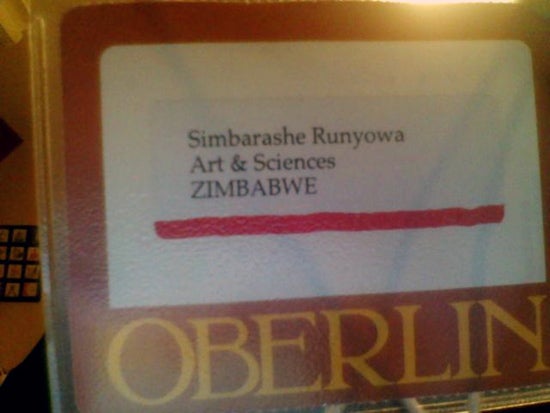Even the son of a chief becomes a subject when he is in a foreign kingdom.
— Zimbabwean proverb.
AFRICA, as we know it, or as the media has conditioned us to know it, is one fierce jungle. Mud huts interspersed with exotic acacia trees all surrounded by thick bushels of greenish scrub and acres upon acres of lengthy blades of grass. Lions, elephants, hyenas and water buffalo are of course aplenty, while hunting wild game and digging for edible roots are just but a few leisurely activities that a college-aged young male can look forward to on a daily basis. Right, Simba?
Well, not quite. It seems like I have just begun delving right into the subject of my very first blog post without even introducing myself. Sorry about that. Hello, I'm Simbarashe, a first-year student at Oberlin from Harare, Zimbabwe. On many an occasion during and after orientation when I have had to introduce myself, I have encountered a number of interesting scenarios in which my first name ignited a hilarious chain of events. From the moment I open my mouth to respond, my accent, a hybrid of British via Zimbabwean dialects immediately unmasks me as someone who did not grow up in America. The next obvious question I am asked is "So, where are you from, Simba?" and I often respond with a gentle yet confident "Zimbabwe."

This is really where the conversations either totally collapse or pick up a tremendous amount of momentum. Responses range from vacant, bemused stares to the natural "Wow, that's far" to the incredibly detailed "So what do you think of Zimbabwe's present transitional government?" I am always amused by this spectrum of answers, and the intellectual discourse generated by my merely introducing myself as a Zimbabwean called Simba (a name notorious for its Lion King connotations). In one instance, I ended up having a two-hour long discussion on US foreign policy in the Maghreb, Libya, the famine in East Africa, Mubarrak, et cetera, et cetera. This is one of the few things that I have begun to love about Oberlin students: they are extremely intelligent, well read, worldly people who are truly engaged with the WORLD beyond their immediate environs.
But let's hold it right there. How did I even find Oberlin? From Zimbabwe? I mean, they don't have internet in Zimbabwe do they? ... *Silence*
Indeed, I have had a lot of questions from people curious about what my life has been like in Zimbabwe. Did we have "tall" buildings in Zimbabwe? Like skyscrapers? Was I from a tribe? If so, which one? Which language did I speak? What of the internet, I didn't have "a Facebook" right? Had I petted a lion? How come I spoke English? Many of these questions, of course, have been the staple of many a humorous Skype conference with my Zimbabwean friends at other American universities.
Many of my American friends drop their jaws in disbelief when I relate stories of Zimbabwe to them, and assure them that we do indeed, have the internet and running water and lights and "tall" buildings in addition to the more typical lions and elephants with which Africa has been eternally associated in the media. And I am equally puzzled to discover that America is a far cry from the artificial, exaggerated extravagance of Hollywood with which I had come to associate it.
Although it may seem like I come from a radically different world than Oberlin, Oberlin, Ohio is fast becoming my new home and 44074 my area code of choice (No offense, Harare, Zimbabwe, 263-04). I am discovering a lot of those "connectors" that make Oberlin feel like home. Whether it is speaking my home language with my fellow Zimbabweans here at Oberlin, or enjoying an African banquet on Nigerian Independence Day, or fielding questions about Africa at the annual culture festival, I am unearthing those comforting "African" links and reminders one by one.
The wonderfully friendly people here at Oberlin are unbelievably welcoming and ready as can be to embrace Simba from Zimbabwe, cultural eccentricities and confusions attached. Sometimes I forget that I am in another country because I am almost never reminded, or made to feel like I belong to a paradigm of difference. The challenge that now lies before me is simple: How do I merge these two worlds, the one from which I am coming and the one I now living?
Well, I don't quite know. Yet. But I'm pretty sure Oberlin will soon provide the answer.



